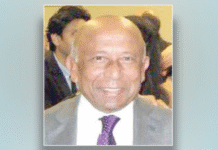Retiring at a highly fraught time, after three decades as chief counsel for the Association for Civil Rights, Dan Yakir looks back on some great achievements – while slamming the Supreme Court for its attitude toward Palestinians and acknowledging his own, main failure

Just when Dan Yakir’s life work is facing clear and immediate danger, he’s retiring. For almost 30 years he served as the chief legal counsel for the Association for Civil Rights in Israel, spearheading a multitude of court battles that advanced the rights of minorities and influenced the lives of tens of thousands: LGBTQ people, candidates for public housing, Arab citizens and many others. But now, while the governing coalition is fast-tracking its plans to engineer a judicial overhaul – he’s decided he’s had enough.
I met Yakir recently on a hot, muggy afternoon at ACRI’s headquarters in south Tel Aviv. On his desk is a small Gay Pride flag, and next to it is a wooden filing cabinet packed with folders, each representing a persistent battle that Yakir and his ACRI associates have waged to foment change in Israeli society. One folder is labeled “Discrimination against sexual orientation,” another states, “Indictment for shooting Palestinian detainee,” and there’s also a folder for “Ka’adan High Court of Justice – housing discrimination in the community of Katzir” – the latter a reminder of the revolutionary court decision in 2000 to the effect that it is illegal to allocate state land solely to Jews.
After completing his master’s degree in international human rights law at American University, Washington, within the framework of the New Israel Fund’s scholarship program, he returned to ACRI in 1989 as the branch’s legal adviser and in 1995 was appointed chief legal counsel.
“What is happening now is simply a nightmare for advocates of human rights,” Yakir says. “We are experiencing a counter-reaction to years of achievements – one that is unprecedented in its audacity, its brazenness, its antidemocratic character and its desire to strike at the country’s democratic institutions and basic human rights.”

While acknowledging that he is leaving “at a time that seems least appropriate from the viewpoint of the external circumstances,” Yakir says he has “a feeling inside that the time has come.” However, he emphasizes, “I am not retiring with a sense of surrender, of giving up. ACRI is in a strong, stable situation despite these threats, and an excellent new generation has emerged there.”
- Israeli settlements use racist law to reject secular and divorced residents
- A Zionist youth movement that wants to shape Israeli Arab minds? Sounds legit
“I was astounded at Levin’s effrontery and brutality, at his attempt to carry out a sweeping coup in a single stroke,” he notes. “Happily, it turned out to be a two-edged sword: The response by the protest movement has been no less unexpected than the speech itself. This is a broad protest the likes of which we have never seen here. It is blocking the dangerous overhaul, and in my opinion it won’t happen in the form that Levin envisages.”
The optimistic assessment notwithstanding, ACRI is preparing for every eventuality. The association, which is playing a major role in the struggle to thwart coalition efforts to weaken the judiciary, has been formulating position papers, appearing before Knesset committees and filing petitions to the High Court of Justice. One such petition, which the court deliberated in early June, dealt with the amendment to the Police Ordinance that would enable National Security Minister Itamar Ben-Gvir to set police policy; the court has given Ben-Gvir and the government 90 days to explain why the controversial amendment should not be repealed.
“We already have a draft petition prepared against moves to change the composition of the Judicial Appointments Committee, should that happen,” Yakir notes, adding that the association’s position is that politicians in general, and members of the current coalition in particular, should not have automatic control over that committee.
At the same time, he warns, “We are seeing moves that overlap with and supplement the overhaul, in which the Ministerial Committee for Legislation is approving more and more laws directed against academia, the media, civil society organizations and more: proposals to tax donations [from foreign sources] to nonprofit organizations, to compel academic institutions to expel students who have said one thing or another, intervention in media broadcasts and expulsion of journalists critical of the government … The danger this government poses is considerable.”
It seems, Yakir continues, that the government has changed its tactics and decided to legislate the judicial revolution by piecemeal legislation. This week the Knesset’s Constitution Committee supported the holding of a first vote on the bill to repeal the so-called reasonableness standard. If it is enacted, it will diminish the power of the courts to review (or invalidate) decisions of elected officials and civil servants that infringe upon basic human rights.

‘Combined offensive’
In 2005, when the Israel Police refused to allow to issue a permit for the Pride parade to take place in Jerusalem, Yakir was one of the petitioners to the High Court, which ultimately enabled the event to go ahead. After deliberating ACRI petitions submitted over the next few years, the court handed down an unprecedented ruling, instructing the Interior Ministry to register as married same-sex couples who wed abroad and could present an official marriage certificate from the country in which the ceremony took place.
We are experiencing a counter-reaction to years of achievements – one that is unprecedented in its audacity, its brazenness, and its desire to strike at the country’s democratic institutions and basic human rights.
Dan Yakir
Yakir: “The 1990s and the early 2000s were the golden age when it came to advancing LGBTQ rights. But all these issues are under serious threat today. Even the relatively marginal matter of changing the [wording on] forms in the Interior Ministry from ‘father and mother’ to ‘parent 1 and parent 2’ is under attack, in addition to which, we have just heard that the Health Ministry is delaying authorization of directives that would benefit transgender individuals. There is a combined offensive underway on all fronts, against the democratic institutions, the attorney general and fundamental civil rights in this country.”

Yakir and ACRI have also made significant strides over the years in the realm of freedom of expression – although here, too, the threats still exist. Yakir refers to what he calls the “Miri Regev project” as one of the most important efforts in this sphere: “From the moment Regev took over in the Ministry of Culture and Sport [in 2015], we identified a significant threat to artistic freedom of expression. We made a strategic decision not to leave her alone and to block her whenever she tried to impose censorship on or block [government] funding to cultural events.”
In September 2016, Yakir and ACRI associate Yonatan Berman petitioned the High Court to cancel the “Miri Regev amendments,” under which a fine would be levied on performing arts groups that declined to appear over the Green Line, while, conversely, a bonus would be offered to such institutions that did perform there. In May 2020, the justices ruled that granting such a bonus curtailed the freedom of expression of institutions that refuse, on ideological grounds, to hold events in the settlements. They also determined that government officials were forbidden to cite a “freedom of funding” policy to justify inculcation of their views among the public.
“There was no area of culture or art in which Regev didn’t try to cause trouble: theater, film, dance, the plastic arts,” Yakir recalls. “And in all in those cases, in an instance of rare cooperation with the then-assistant attorney general, Dina Zilber, we succeeded in preventing the minister from intervening in artistic content and in protecting freedom of speech.”
The current minister of culture, Miki Zohar, also took office with great fanfare and announced his intention in January to withhold state funding from creative artists and cultural institutions that “harm Israel’s good name” and “promote the enemy’s narrative.” Soon afterward, ACRI asked Attorney General Gali Baharav-Miara to declare Zohar’s policies illegal; she has not yet weighed in.
“In the meantime, Zohar has desisted from dealing with cultural content and has gone back to persecuting human rights organizations,” Yakir says wrily. “My most serious concern is that the [two culture] ministers’ behavior has brought about self-censorship on the part of cultural institutions, to the point where they have become apprehensive about dealing with sensitive issues so as to avoid coming into conflict with the authorities.”
Yakir is worried that the present government will roll back the accomplishments ACRI has chalked up over many years. “The threats to our achievements are graver than ever before, and these achievements are indeed fragile, as they can be overturned by legislation,” he says, although this is not something that’s come to pass as of yet. Indeed, the association has maintained ongoing contact with the professional staff in the government and the Knesset for decades.

Yakir: “Thanks to ACRI’s reputation and professionalism, our comments regarding legislative proposals are taken seriously. In 2017, when the then-education minister, Naftali Bennett, ordered the Center for Technological Education to cancel a conference with ACRI to mark International Human Rights Day, the attorney general at the time, Avichai Mendelblit, emphasized to him the importance of cooperating with civil society organizations, and insisted that any decision about continued cooperation between his ministry and ACRI take place only after consultation with the attorney general’s office.”
But good relationships with the professional echelons are not enough – the political identity of Knesset lawmakers has tremendous influence when it comes to the association’s activities.
“Over the years, ACRI has forged unusual forms of cooperation, such as with former MKs Shaul Yahalom and Yitzhak Levy from the [now-defunct] National Religious Party, who were particularly sensitive to the rights of suspects, detainees and defendants, along with Shas MK [and today, the acting health and interior minister] Moshe Arbel, on social issues. However,” Yakir adds sadly, “with a government that is trying to promote an antidemocratic agenda today, it is far more difficult to advance human rights.”
Our sister organization in Hungary is dealing with a judicial system whose independence [Prime Minister] Orban is eroding. It’s scary to see how the government here is trying to push through the same measures as Orban has.
Dan Yakir
As an example of what he sees as a regressive trend that began to take hold some time ago, he cites the case of the Ka’adan family, from the city of Baka al-Garbiyeh, whose request to purchase land to build a house in the nearby Jewish community of Katzir was rejected because they were Arabs. After over some five years of deliberation, the High Court in 2000 granted the petition by Yakir and his colleague, attorney Neta Ziv, against the Jewish Agency and what was then called the Israel Land Administration, ruling that the exclusive sale to Jews of the public land those bodies administered was illegal and that the state must allow the family to establish a home in Katzir.
“There were people who lamented that the judgment spelled the end of Zionism,” Yakir recalls. However, this was not the end of the government’s moves to Judaize parts of the country. In 2011, the Knesset passed a law enabling formation of admission committees in communities of up to 400 families, in the Negev and the Galilee, allowing them to reject non-Jews seeking to reside there. In a similar vein, 2018 brought enactment of the nation-state law, which sees “development of Jewish settlement as a national value.”
“And now the Ministerial Committee for Legislation has approved the expansion of the Admissions Committees Law around the whole country, to encompass communities of up to 1,000 families,” Yakir says. “The state is thus enabling discrimination against Arabs and is essentially invalidating the Ka’adan judgment and the struggle for equality.”

In another realm, another ACRI battle waged by Yakir resulted in a 1999 High Court decision prohibiting the Shin Bet security service from torturing Palestinian detainees in its interrogations. The ruling was handed down five years after the Public Committee Against Torture in Israel had filed an initial petition on the subject in 1994, and after several cases of death in the wake of Shin Bet interrogations, most notably that of Abdel-Samad Harizat in 1995. That year, the association submitted its own petition and the cases were consolidated.
“The High Court decision on the petition of the Committee Against Torture led to a significant change in the situation,” Yakir observes. “Although torture has not vanished from the land, it has stopped being used as a routine measure. It is now defined as ‘necessary interrogation’ and requires special authorization from high level officials at the Shin Bet. There was an uproar in the country when these methods were used against Jews – what is unacceptable to the public when Jews are concerned is much more tolerated when it concerns Palestinians.”
The Ka’adan and Shin Bet judgments, drafted by Justice Aharon Barak, at the time the president of the Supreme Court, were handed down when the High Court was at the height of its glory. Today, more than 16 years after Barak retired (at the mandatory age of 70), he is facing fierce attacks on his life’s work and stormy demonstrations by right-wingers outside his home.
“I feel sorry for Barak,” Yakir says. “He is being demonized – unjustly, of course. Barak left the deepest imprint on the doctrine of human rights in Israeli jurisprudence. He was in the forefront when it came to recognition of the revolution that the Basic Laws generated in the realm of human rights 30 years ago. Even earlier, he advanced freedom of speech, the right to demonstrate and the right to equality. After the enactment of the Basic Laws, he was a central partner in according a broad interpretation to the right to human dignity such that it would subsume also the rights of freedom of speech, freedom of religion and the right to equality.”
Top court criticism
While Yakir praises Barak for advancing the rights of Israel’s citizens, he castigates the way the former justice and the Supreme Court have treated the rights of the Palestinians under Israeli occupation.
“No one comes to Barak with complaints about his real transgressions. He legitimized the occupation and expanded immeasurably the power to undermine Palestinians’ rights,” Yakir explains. “It’s not clear to me how Barak, with his liberal approach, could allow the demolition of the homes of innocent people because one member of the family is a terrorist.”

Yakir adds that the only absolute prohibitions that exist in international human rights law are those that apply to torture and collective punishment. “The demolitions of homes is a gross injustice, and there are only isolated voices in the Supreme Court that reject it. Justices Mishael Cheshin, Meni Mazouz and George Kara opposed it in the past, and Justices Uzi Vogelman, Anat Baron and Khaled Kabub oppose it today, but the majority on the bench supports [the demolition policy]. The court is thus acting with a double standard in regard to the territories and the occupation. The fact that even two presidents of the Supreme Court, Miriam Naor in the past, and now Esther Hayut, have blocked requests for further deliberation regarding the law that permits the demolition of the homes of terrorists, is a mark of shame on them.”
Yakir’s criticism of the top court doesn’t end there. In his view, “some of the justices dehumanize the Palestinians and don’t treat them as human beings with equal human rights. They should maintain the opposite conception: that it’s precisely unprotected residents living under occupation who need to enjoy greater protection – both in terms of international law and morally.”
The fact that two Supreme Court presidents blocked requests for further deliberation regarding the law permitting demolition of terrorists’ homes is a mark of shame.
Dan Yakir
Moreover, he notes, ACRI faces many legal challenges related to the Palestinians and the occupation, which rights organizations abroad do not have to address; those foreign entities are thus free to focus on other pressing issues, some similar to those rising to the fore now in Israel. For example, in light of the coalition’s current moves to perpetrate a judicial revolution in Israel, ACRI has been in touch with counterparts in Hungary and Russia – countries where the political-judicial situation is also becoming extremely grave.
“Our counterpart organization in Russia has been compelled to move its activity outside the country because of government pressure,” he says, “and our sister organization in Hungary is dealing with a judicial system whose independence [Prime Minister Viktor] Orban is eroding, which severely limits the ability to mount a legal challenge to the measures he has taken during his years in power. It’s scary to see how the government here is trying to push through the same measures as Orban in Hungary.”
In any event, on the eve of his retirement, Yakir acknowledges that the greatest failure of his career has been the inability to head off grave efforts to harm the rights of Palestinians, a matter that still pains him. In May 2022, after more than two decades of deliberations and attempts at mediation, the High Court rejected an ACRI petition originally submitted in 2000 against the expulsion of the inhabitants of the Masafer Yatta hamlets in the South Hebron Hills.
“Justice David Mintz handed down a severe judgment that involved decisions that are mistaken, in my view, according to which an order issued by the military commander in the territories supersedes the stipulations of international law,” Yakir says. “The ruling was issued by surprise on the eve of Independence Day last year. I had a really bad feeling about it. I thought about the Palestinians who are forced to live under the growing harassment of the Civil Administration and the attempts to make their lives intolerable. I didn’t celebrate Independence Day.”









